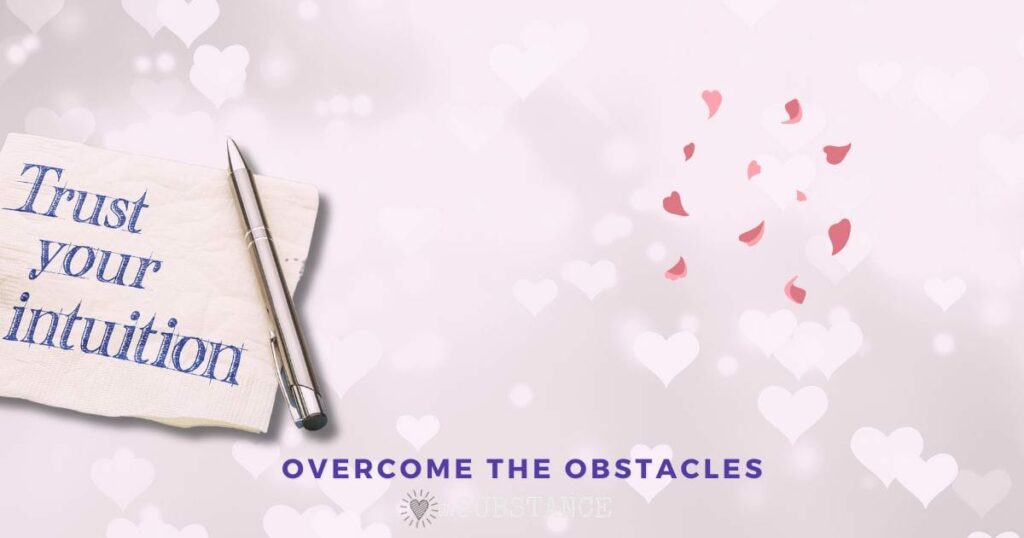One of the biggest problems you can have with accessing your intuition is overthinking. You may also feel pressure to conform to societal norms, expectations, or other constraints, which can cause you to ignore your inner voice.

Trusting your intuition can be difficult for a number of reasons. Here are some sure signs as to why you might be ignoring it:
- Doubting your own feelings or abilities
- Fear of making mistakes or being wrong
- Reflecting on past experiences
- Social conditioning or cultural expectations that prioritize logic and reason over intuition
- Stress and angst. External factors tire you and drain your energy
Overthinking your intuitive feelings is a sure sign you’re ignoring your intuition.
Let’s say you have a job offer that meets your requirements and would be a great opportunity for you. However, you start overthinking and analyzing every detail of the job offer, such as the salary, benefits, and job responsibilities. While doing so, you start to doubt yourself and your abilities to succeed in the position, which leads you to ignore your gut feeling that the job is a good fit for you. As a result, you may end up declining the offer and missing out on a potentially great opportunity.
Here’s the thing…
- A societal bias towards logic and rationality can lead you to ignore your gut feelings.
- Past experiences of being wrong or making mistakes can erode confidence in your intuition.
- Fear of making the wrong decision or being judged by others can also play a role in inhibiting trust in your intuition.
- External factors such as stress, fatigue, or information overload can interfere with your ability to tune into your intuition and accurately interpret your inner voice.
1. You doubt your abilities
Self-doubt can prevent you from acknowledging your intuition because you may question how the right outcome can come to you so easily. You may worry that your ‘inner voice’ will lead you astray or that you don’t have enough knowledge or experience to produce such an outcome. This can lead to second-guessing yourself and relying on others’ opinions instead of trusting your gut feelings. Also, low self-confidence can make you more susceptible to external pressures and expectations, which can further cloud your judgment and intuition. You lose faith in your own judgment.
Imagine you have a job offer for a position that sounds great, but something just doesn’t feel right about it. Your gut is telling you to decline the offer, but you start to doubt yourself and worry that you’re being overly cautious or that you won’t get another opportunity like this. Without self-confidence, you might ignore that feeling and accept the job, only to realize later that it wasn’t a good fit for you. Trusting your instincts requires a certain level of self-assurance, and lacking that confidence can make you second-guess yourself and miss important cues from your intuition.
2. You fear Doing the wrong thing
A fear of failure can prevent you from recognizing your inner wisdom. How? Why?
- Because it is a strong emotion that will cloud your access to intuition
- At some point, you might have confused this emotion with true knowing and lost faith in your judgment
Now, you may worry that making such a mistake will reflect poorly on your image or lead to negative consequences such as losing a job or damaging a relationship.
You may second-guess yourself and rely more heavily on logic and analysis, even when your intuition may be telling you something different.
Here’s this in context: Imagine a person who has always been passionate about creating art paintings. They have a clear vision of what they want to create, but they are hesitant to trust their gut and express themselves freely because they fear failing and being judged by others.
This blockage of intuition may cause them to hold back and not fully explore their talents, ultimately hindering their ability to produce their best work.
3. You overthink your Past experiences
As I just mentioned, past experiences can shape your judgment and how you make choices in the now.
Imagine if in the past, you followed what you thought was your gut feeling and it led to a negative outcome. For instance, you trusted someone who ended up betraying you or you made a rash decision that resulted in loss. Overthinking the experience may cause you to ignore your inner wisdom and miss out on opportunities.
Another example could be avoiding a certain type of food or restaurant because you got food poisoning from it before, even though your common sense is telling you it’s safe to try again.
4. You like to follow the crowd
Societal conditioning can create beliefs and expectations that may conflict with your intuition, causing you to dismiss your own inner guidance.
For example, you are conditioned to value logic and reasoning put to you by others over your intuition. You prioritize the opinions of others above your own.
Societal or cultural conditioning can influence your inner compass and make you question your gut feelings. It is important to recognize these influences and work towards trusting your intuition while also being open to rational analysis and outside perspectives.
If you’re a person who has been taught from a young age to always follow rules and authority figures, you may have trouble trusting your intuition, even if you believe something is morally wrong.
For example, if you are in a situation where you are being pressured to do something you feel uncomfortable with, you may feel hesitant to speak up or take action because you have been conditioned to prioritize obedience above your own inner wisdom.
Cultural norms and expectations can discourage us from trusting our intuition and instead rely on external factors like data or other people’s opinions.
5. You’re feeling overwhelmed
Feeling overwhelmed is a common symptom of ignoring your intuition. This is because your intuition is your inner voice, and when you ignore it, you can end up making choices that are not aligned with your true desires or values. When you are not living in alignment with your intuition, it can create feelings of stress, anxiety, and confusion. These feelings can often lead to overwhelm, as you struggle to make decisions and feel like you are not making progress in your life.
Breaking through the noise and overcoming obstacles to hear your intuition requires self-care…
Information overload can leave you feeling mentally cluttered and unable to distinguish your own thoughts from external noise. All of these factors can lead to you ignoring your inner voice and make it more challenging for you to make clear decisions or to take the right action.
A regular meditation practice is a good way to still the noise and open the way for intuition.
Tips for overcoming obstacles to trusting intuition
Here are some tips I’ve discovered for overcoming these blocks to trust your intuition:
- Practice mindfulness and self-awareness to better understand your intuition and build trust in it. Journaling and meditation will help.
- Start small by trusting your intuition and build up to bigger things. Train your intuition – see my article on how.
- Learn from those that don’t work out and use them as opportunities for growth and improvement.
- Take care of your physical and mental health to build resilience and confidence.
- Challenge your limiting beliefs and practice self-compassion.
Here’s more
Self-talk — remind yourself that you have the power to make your own decisions and that your intuition is a valuable tool.
You may also want to challenge any negative or limiting beliefs you have about yourself and your abilities to make confident choices.
It can be helpful to practice mindfulness and tune into your body’s physical sensations to better understand your gut feelings.
Finally, surround yourself with supportive people who encourage you to trust yourself and your instincts.



